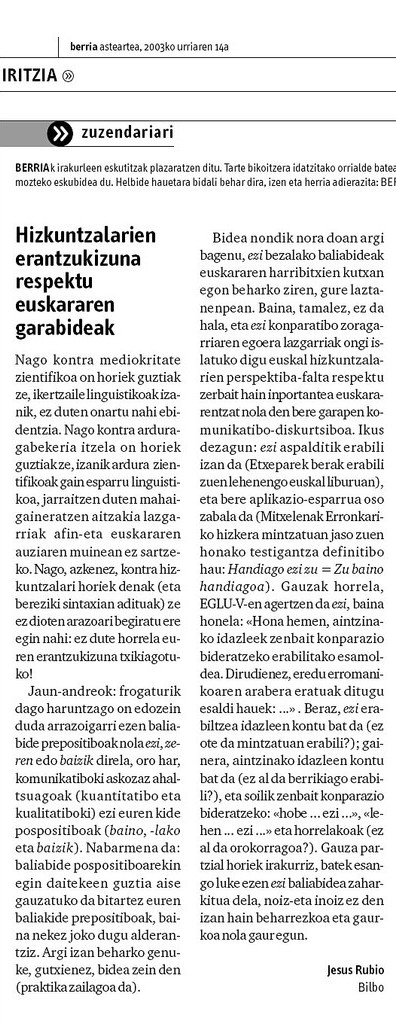Gure hizkuntzalari eta akademiko
Xabier Kintana-k dio:
... ez baitut uste, "etxe horretan" esateko "an etxe hori" bezalakoak idazten dituena inori maisu-irakaspenik emateko dagoenik.
Xabier Kintana-k hartu du
adibide ezin sinpleago (non ez den ongi ikusten kontua) afin desitxuratu bide garakor bat zeinen izateko arrazoia dén
diskursiboa (nahizta, behin baliabide bat hizkuntzan sartuz gero, halako kasu sinpleetan ere erabiliko zen libertade osoz, jakina).
Hori da nola frogatu nahi izatea ze "
zeren"
kausala ez da beharrezkoa
zeren ez luken zentzurik esátea "
zeren bainaiz satsua", zein den agertzen an
Etxepare (1545) (edo, idatzi beharko genuke "
in Etxepare (1545)"?). Bistan da: "
zeren" baliabideak
nabarmentzen dá noiz aurkéztu perpaus luze edo konplexuagoak, nola onartzen duén Txillardegi-k berak ere:
Onartu beharra dago, beraz; batez ere, denaz gain, perpausa luzeetan eskaintzen dituen aukera aberatsengatik. Txillardegi, Euskal Gramatika, 1979:400]
Bichakjian-ek dio (an "
Language Evolution and the Complexity
Criterion", 1999):
The advantage of the modern order is hardly apparent if we compare brief segments such as 'victoriam reportavit' and 'he won a victory', or the Engl . 'a red ball' and the Fr. 'un ballon rouge'. But the important advantage of a technique, however, is not to do the simple things drastically better, but to achieve what was out of reach or to produce easily what required considerable effort. The advantage of an internal combustion engine over the sprocket wheel of a bicycle is negligible when it is matter of going to the corner store for a quart of milk, but it becomes noticeable when pounds of groceries are to be hauled from a distant supermarket. Likewise, if a comparison is made between the following sentences, where the first one uses head-last structures and the second their head-first equivalents, it quickly becomes apparent that sentence 1, though formally correct, is in fact difficult to decode and ambiguous, whereas sentence 2 does not present any problem, neither for the speaker nor the listener.
1. (The dog chased) the cheese eating mouse catching cat.
2. (The dog chased) the cat that caught the mouse that was eating the cheese.
Similar restrictions occur in German, where the head-last order is a must in subordinate clauses (3), but becomes impossible when the modifier is an embedded sentence (4).
3. Ich glaube, dass Heinz das Buch gelesen hat lit. 'I believe that John the book read has'
4. *Ich weiss, dass du, dass Heinz das Buch gelesen hat, glaubst lit. 'I know that you that John the book read has believe'
In those cases, German abandons the canonical head-last order and uses instead the more manageable head-first alternative (5).
5. Ich weiss, dass du glaubst, dass Heinz das Buch gelesen hat lit. 'I know that you believe that John the book read has'
(cf. Bach et al. 1986; and Kempen 1996 for corroborating psycholinguistic evidence).
Beraz, Kintana-k
kritika serioa eta argumentatua egin nahi badu,
har ditzala adibide representatiboak eta
eman ditzala argumentuak,
eta ez zeharkako komentarioak zek ez dioten ezer ere aportatzen ki eztabaida (ikus "Euskararen garabideak" eta blog hau). Adibide bat: nóla emanen luke Xabier Kintana-k ondoko gutunaren aurreneko paragrafoa?

Ez da dudarik ze
aditza aurreratzea oso egokia da asko eta askotan, hala nola ze euskara estandarrean desagertu beharko litzake
galdegaiaren araua.
Ez da dudarik ze bádira euskararen tradizioan baliabide batzuk zein diren oso interesgarriak afin lortu emaitza progresiboagoa, eta zein, praktikan, bazterturik dauden an euskara estandarra, hala nola adibidez "
zein"
erlatibo murrizgarria edo
"
ezi"
konparatiboa.
Ez da dudarik ze bádira beste baliabide batzuk zein, gutxi erabili badira ere, bádauden eskura, hala nola adibidez "
afin"
finala,
"
bitartean-eta"
denborazkoa, edo "
kontra"
prepositiboa, zein
erabiltzen dén iragarriz pilota-partidak (ez dakigu Kintana-k zer pensatuko duen burúz erabilera hori).
Ez da dudarik ze, antzera nola "
baizik" prepositiboa oso erabilgarria den, berdin ere izan litezke erabilgarriak (baldin eskura baleude) beste antzeko baliabide desdoblatu batzuk nola "
burúz", edo "
artén", edo "
kin", edo "
on", edo "
an", zein, jakina,
konbinatu daitezke kin beste baliabide guztiak (postpositiboak barne) afin lortu soluzio komunikatibo abantailatsuak.
Beste kontu bat da
ritmoa, zéin ritmotan gertatu behar dén garapen-prozesu hori (ikus beherago gure komentario bat non diogun ze tresna horiek bultzatu beharko liraké
gradualki, baina galdera da:
zéin da ritmo gradual optimoa?): hor egon ahal da duda gehiago, eta akaso hor zentratu beharko litzake debatea (edo dena delako hau). [63] [
>>>]
Etiketak: Bichakjian, estandarra, Etxepare, gradualki, Kintana, kontra, zientzia





